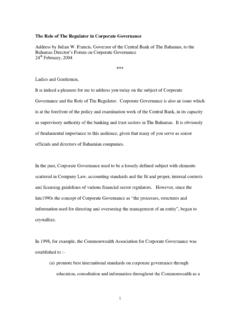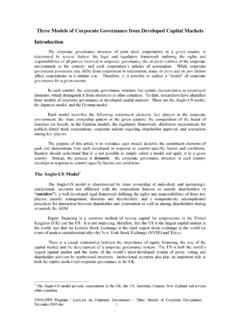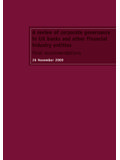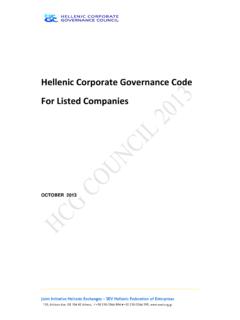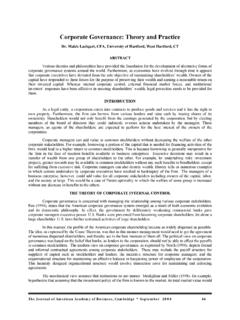Transcription of i Malaysia - ZICO Law
1 EUROPEAN LAWYER REFERENCE SERIES vMalaysiaMalaysiaWooi Hong Tan Zaid Ibrahim & Co*1 GENERAL What are the general principles of corporate governance in your jurisdiction? What are the main objectives of the corporate governance principles? Is your legal system based on common law, civil law, Islamic law or something else?The corporate governance framework in Malaysia is built on several inter-related principal and subsidiary legislations and guidelines (see paragraph below). The general principles of corporate governance are statutorily codified under the Malaysian Companies Act 1965 (Companies Act). The legal system in Malaysia is substantially based on common the Companies Act, every director of a company is under a duty to, at all times, exercise his powers for a proper purpose and in good faith in the best interest of the company. It also describes the manner in which a director is expected to make business judgments.
2 This is further discussed in paragraph 4 Securities Commission Malaysia (SC) launched the Capital Market Masterplan 2 (CMP2) to expand the role of the capital market in invigorating national economic growth. The SC recognises in the CMP2, that growth is only sustainable if it is underpinned by a proper system of accountability and governance . Strengthening corporate governance therefore represents one of the key thrusts to reinforce investor confidence in the Malaysian capital 2011, the SC released the corporate governance Blueprint 2011 (Blueprint) which provides the action plan to raise the standards of corporate governance in Malaysia by strengthening self and market discipline and promoting greater internalisation of the culture of good 2012, the Malaysian Code on corporate governance 2012 (MCCG 2012) was issued. All companies are encouraged to adopt the principles and recommendations of MCCG 2012 and make good corporate governance an integral part of their business dealings and Have there been any recent developments in the law, codes and rules of corporate governance ?
3 The Financial Services Act 2013 (FSA) came into force in 2013 consolidating the regulatory and supervisory framework for Malaysia s banking industry, insurance industry, payments systems and foreign exchange administration matters. It repealed the Banking and Financial Institutions Act, the Insurance Act, the Payments Systems Act and the Exchange Control Act. Malaysiavi EUROPEAN LAWYER REFERENCE SERIESThe Islamic Financial Services Act came into effect in 2013 and sets out the regulatory framework for Malaysia s Islamic financial sector with the principal regulatory objectives of promoting financial stability and compliance with Syariah (Sharia law). This Act repealed the Islamic Banking Act 1993 and the Takaful Act 2014, SC and the Minority Shareholder Watchdog Group (MSWG) launched the Malaysian Code for Institutional Investors (Code), a code and a set of best practices collectively developed by Malaysia s largest institutional investors namely the Employees Provident Fund (EPF) and others.
4 It aims to set out broad principles of effective stewardship by institutional investors such as their disclosures of stewardship policies, monitoring of and engagement with investee companies and managing conflict of interests. The adoption of the Code s principles by institutional investors demonstrates their intent towards good corporate governance . Outline recent court cases and incidents involving corporate governance issues. Were there any significant corporate scandals or large unlawful corporate cases?Insider Trading On 29 January 2015, the SC charged five individuals with insider trading offences under section 188(2)(a) of the Capital Markets and Services Act 2007 (CMSA), punishable by a term of imprisonment not exceeding ten years and a fine of not less than MYR1 million. The managing director of the group at the material time, was charged for acquiring 2,766,600 units of the shares of the group whilst in possession of non-public information.
5 Share Manipulation The SC took action against seven individuals for the manipulation of shares of an information and communications technology company. The charge against the defendants is that over a one-week period, they actively transacted in the company shares among themselves, causing the price of the shares to artificially rise by The SC sought a disgorgement of all profits earned by the defendants as a result of the manipulation. The SC also claimed a civil penalty of MYR1 million from each defendant, and barred the defendants from being directors of any public listed company and from trading on the stock exchange for a period of five years. Which law enforcement agency is in charge of enforcing corporate governance ? May a criminal sanction be levied upon infringement of the corporate governance rules?Enforcement of corporate governance is jointly undertaken by a number of regulators including the Companies Commission of Malaysia (CCM), the Malaysian Anti-Corruption Commission (MACC), the SC and the Royal Malaysian Police.
6 Financial institutions are further regulated by the Central Bank of Malaysia (BNM). Criminal sanctions may be levied depending on the nature of the LAWYER REFERENCE SERIES vII2. SOURCES OF Which laws, codes or statutes govern company structures and organisations? Are there statutes like the Companies Act or other forms of law? Is there much relevant case law?The Companies Act (and its subsidiary instruments) is the primary legislation governing companies in Malaysia . However, there are additional legislations, codes and rules which supplement the Companies Act: The Capital Markets and Services Act 2007 (CMSA). The Malaysian Code on corporate governance 2012 (MCCG). The Malaysian Accounting Standards Board s (MASB) Approved Accounting Standards. The Code of Ethics for Company Directors (issued by CCM). The Code of Ethics for Company Secretaries (issued by CCM).
7 Some legislation imposes direct responsibility on directors and officers with respect to the company s compliance with certain obligations. For example, under the Employees Provident Fund Act 1991 and the Employees Social Security Act 1969, the directors of a company are jointly and severally liable for contributions due and payable to the Employees Provident Fund and the Social Security Organisation by such company that remains unpaid. Additional laws may also apply depending on the nature of the company s business (for example, financial institutions are subject to the Financial Services Act 2013 and the Islamic Financial Services Act 2013).That said, a distinction must be made between companies incorporated under the Companies Act and companies incorporated under Labuan Companies Act 1990. A company incorporated under the Labuan Companies Act 1990 would be regulated by the said law and not Companies Act 1965.
8 The distinction is a result of the categorisation of Labuan as a mid-shore jurisdiction. As such, a company incorporated under the Labuan Companies Act 1990 would be governed by the Labuan Financial Services and Securities Act 2010 and not CMSA 2007, amongst other legislation. In addition, public companies listed on the Main Market of Bursa Malaysia , regardless of the legislation they were incorporated under, are bound to observe, among others, Bursa Malaysia s Listing Requirements (Listing Requirements). Chapter 15 of the Listing Requirements sets out corporate governance requirements that must be complied with by a listed issuer and its directors. The legislations, codes and rules may be interpreted by the courts, the numerous decisions of which form the collection of case law on this Which laws, codes or statutes regulate capital markets in your jurisdiction?
9 The primary legislation regulating capital markets in Malaysia is the CMSA and its subsidiary legislation. The SC also issues guidelines and circulars from time to time to effect the operation of the CMSA. The Listing Requirements apply to companies listed on the stock exchange, which among others, requires listed companies to make continuous disclosures with respect to certain types of EUROPEAN LAWYER REFERENCE SERIESIn 2015, Securities Commission Malaysia released the Guidelines on Regulation of Markets under Section 34 of CMSA 2007 to introduce new requirements for the registration of equity crowd funding (ECF) platforms and provide governance arrangements for the operator of such platforms. ECF is a new form of fundraising that allows start-ups or other smaller enterprises to obtain capital through small equity investments from relatively large numbers of investors.
10 Are there any public interest laws which apply to or influence corporate governance ?The legislative trend in Malaysia leans towards imposing responsibility for compliance on directors and officers of the company. Examples of public interest legislation with corporate governance elements include: The Employment Act 1955. The Occupational Safety and Health Act 1994. The Environmental Quality Act 1974. The Anti-Money Laundering and Anti-Terrorism Financing Act 2001. The Personal Data Protection Act Whistleblower Protection Act 2010 prohibits the taking of any detrimental action against persons making disclosures of improper conduct in the public and private Have there been any recent developments in any of the above laws? What are the recent changes to the above laws or rules and the reasons for them?In 2014, the SC launched the Sustainable and Responsible Investment (SRI) Sukuk framework to facilitate the financing of sustainable and responsible investment initiatives.
